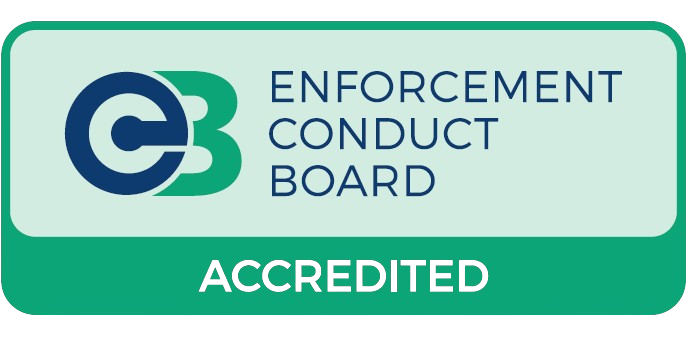
High Court Enforcement Officers, Enforcement Agents & County Court Bailiffs – What’s the Difference?
There is a great deal of confusion about the language used for enforcement in England and Wales. Terms such as “High Court Enforcement Agent” and “Sheriff” are still heard every day, even though they are no longer correct in law for England and Wales.
This guide explains the difference between High Court Enforcement Officers (HCEOs), Certificated Enforcement Agents (CEAs) and County Court Bailiffs, and sets out the main types of work each can carry out.
There Is No “High Court Enforcement Agent”
In law, there is no such role as a “High Court Enforcement Agent” in England and Wales.
High Court work is controlled by individuals personally appointed by the Lord Chancellor as High Court Enforcement Officers (HCEOs). They hold the authority to execute High Court writs, but it is usually Certificated Enforcement Agents (CEAs) who attend at premises on their behalf.
The phrase “High Court Enforcement Agent” is therefore a misdescription. The correct terminology is: HCEO(the officer) and Certificated Enforcement Agent(the person on the ground).
What Happened to “Sheriffs”?
Historically, High Court writs in England and Wales were enforced by Sheriffs. The Courts Act 2003 modernised this and replaced Sheriffs with High Court Enforcement Officers.
Today:
- There are no Sheriffs enforcing civil writs in England & Wales.
- The term “Sheriff” now applies mainly in Scotland and in American jurisdictions.
Using “High Court Enforcement Agent” for work in England and Wales is inaccurate and potentially misleading.
High Court Enforcement Officers (HCEOs) vs Certificated Enforcement Agents (CEAs)
High Court Enforcement Officers (HCEOs)
- Personally appointed by the Lord Chancellor.
- Hold the legal authority to execute High Court writs of control and possession.
- Responsible for compliance and conduct of enforcement carried out under their writs.
- Often operate through authorised High Court enforcement companies.
Certificated Enforcement Agents (CEAs)
- Individuals holding a certificate from the County Court to act as enforcement agents.
- Carry out physical enforcement on the ground – visits, taking control of goods, etc.
- Can act under the authority of an HCEO, a local authority, HMCTS contractor or landlord (CRAR).
- Important: In England, CEAs are still commonly called “bailiffs” in everyday speech, even though the legal term is enforcement agent.
Certificated Enforcement Agents vs County Court Bailiffs
County Court Bailiffs and Certificated Enforcement Agents both carry out enforcement work, but they are not the same.
County Court Bailiffs
- Employed directly by HM Courts & Tribunals Service (HMCTS).
- Enforce County Court warrants
including:
- Warrants of control (County Court judgments).
- Warrants of possession (residential evictions via the County Court).
- Operate strictly within HMCTS procedures and timetables.
Certificated Enforcement Agents
- Usually employed by private enforcement companies, sometimes directly by local authorities.
- Can enforce a wider range of debts and remedies including:
- High Court writs of control or possession (acting for an HCEO).
- Magistrates’ court fines – via authorised companies under HMCTS contracts.
- Council Tax & Non-Domestic Rates (NDR) – under local authority instruction.
- Commercial Rent Arrears Recovery (CRAR) – rent arrears without a court order.
- Governed by the Tribunals, Courts and Enforcement Act 2007 and Taking Control of Goods Regulations 2013.
Key Takeaways
- There is no such role as a “High Court Enforcement Agent” in England and Wales.
- HCEOs hold the authority for High Court writs; CEAs carry out the enforcement.
- “Sheriff” is no longer used in England & Wales – it applies only in Scotland and the USA.
- County Court Bailiffs are HMCTS staff enforcing County Court warrants.
- Certificated Enforcement Agents mainly work for private companies enforcing High Court writs, local authority debts, CRAR and magistrates’ fines.
- In everyday English, CEAs are still widely known as “bailiffs”, though the legal term is enforcement agent.
Before Anyone Points It Out...
Yes — we know the irony. Our company is called UK Bailiffs, and here we are explaining that there’s technically no such thing anymore as a “bailiff”, “High Court Enforcement Agent”, or “Sheriff” in England and Wales.
The truth is, Certificated Enforcement Agents are still widely known to the public as “bailiffs”, even though legislation updated the terminology years ago. The name UK Bailiffs simply reflects what most people still search for and understand.
So, before the obvious is pointed out — yes, we’re aware of the irony. We just prefer accuracy and honesty about how enforcement really works.



